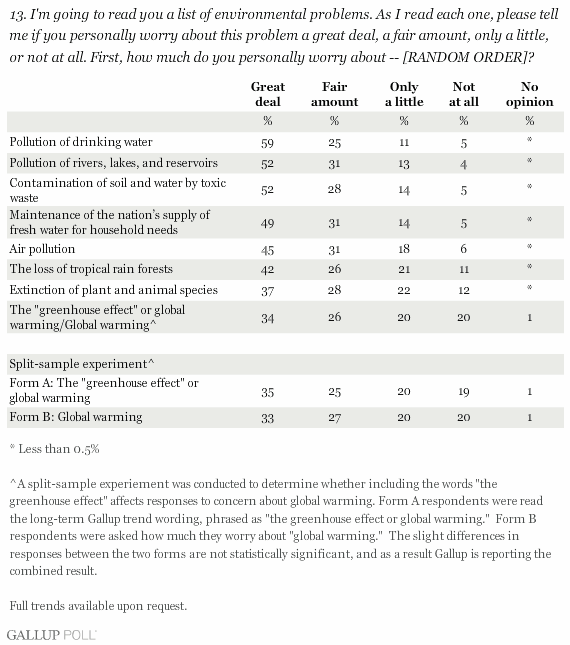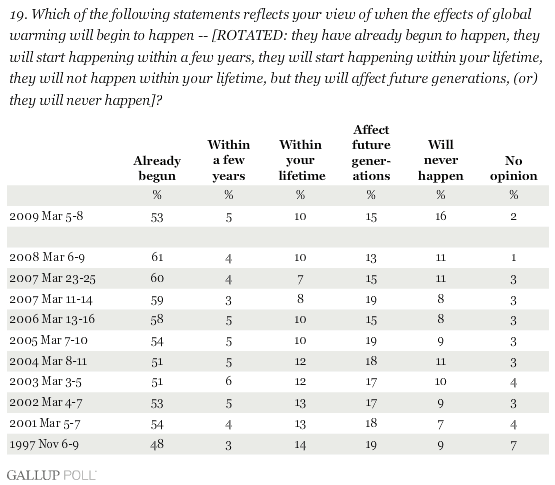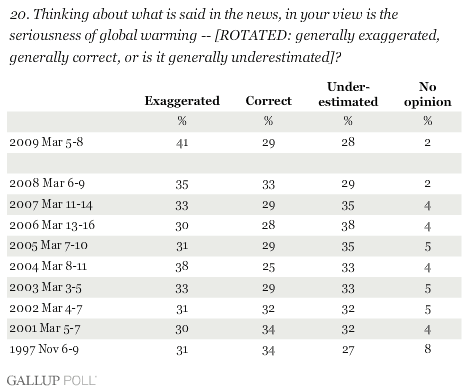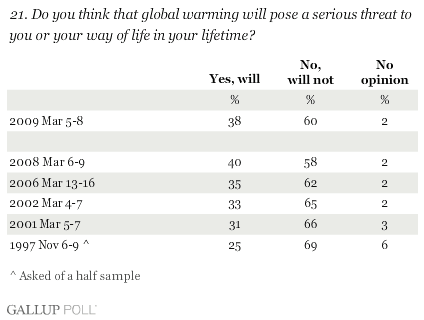PRINCETON, NJ -- Although a majority of Americans believe the seriousness of global warming is either correctly portrayed in the news or underestimated, a record-high 41% now say it is exaggerated. This represents the highest level of public skepticism about mainstream reporting on global warming seen in more than a decade of ���۴�ýpolling on the subject.
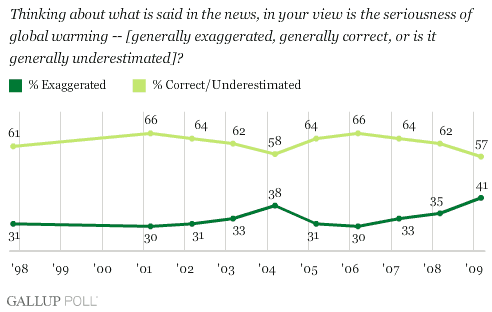
As recently as 2006, significantly more Americans thought the news underestimated the seriousness of global warming than said it exaggerated it, 38% vs. 30%. Now, according to Gallup's 2009 Environment survey, more Americans say the problem is exaggerated rather than underestimated, 41% vs. 28%.
The trend in the "exaggerated" response has been somewhat volatile since 2001, and the previous high point, 38%, came in 2004. Over the next two years, "exaggerated" sentiment fell to 31% and 30%. Still, as noted, the current 41% is the highest since Gallup's trend on this measure began in 1997.
Since 1997, , and that trend continues in the 2009 survey; however, this year marks a relatively sharp increase among independents as well. In just the past year, Republican doubters grew from 59% to 66%, and independents from 33% to 44%, while the rate among Democrats remained close to 20%.
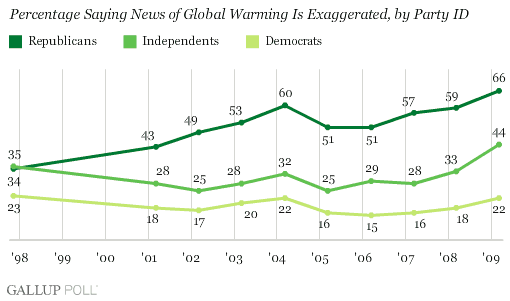
Notably, all of the past year's uptick in cynicism about the seriousness of global warming coverage occurred among Americans 30 and older. The views of 18- to 29-year-olds, the age group generally most concerned about global warming and most likely to say the problem is underestimated, didn't change.
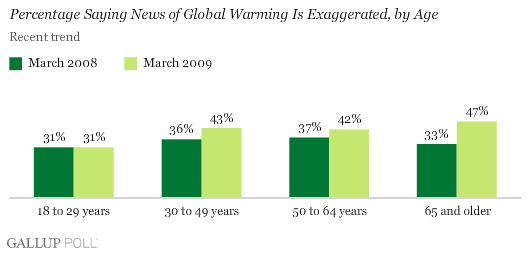
Dampened Concern
Apart from these findings about news coverage of global warming, the March 5-8 poll shows in a similar vein that Americans are a bit less concerned about the seriousness of global warming per se than they have been in recent years.
Six in 10 Americans indicate that they are highly worried about global warming, including 34% who are worried "a great deal" and 26% "a fair amount." Overall worry is similar to points at the start of the decade, but is down from 66% a year ago and from 65% in 2007.
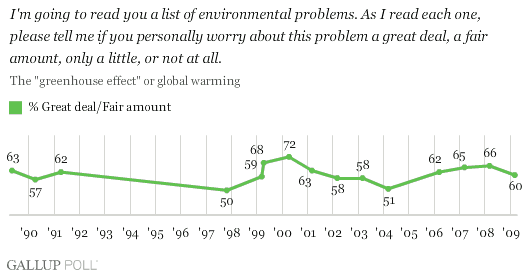
The 2009 ���۴�ýEnvironment survey measured public concern about eight specific environmental issues. Not only does global warming rank last on the basis of the total percentage concerned either a great deal or a fair amount, but it is the only issue for which public concern dropped significantly in the past year.
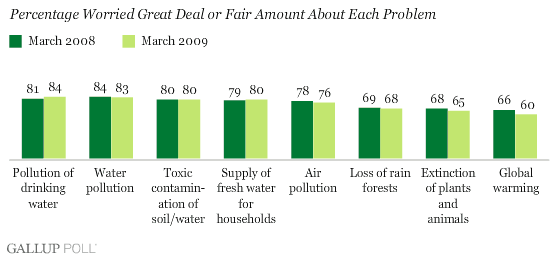
Also, compared with last year, fewer Americans believe the effects of global warming have begun to occur. The figure is now 53%, down from 61% in March 2008. At the same time, a record-high 16% say the effects will never occur. (Prior to now, ���۴�ýpolling found no more than 11% of Americans saying the effects of global warming would never happen.)
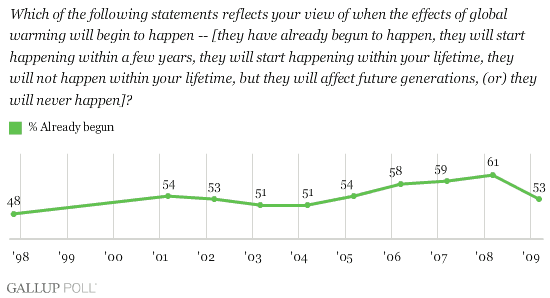
Most Doubt Warming Is a "Serious Threat"
Altogether, 68% of U.S. adults believe the effects of global warming will be manifest at some point in their lifetimes, indicating the public largely believes the problem is real. However, only 38% of Americans, similar to the 40% found in 2008, believe it will pose "a serious threat" to themselves or their own way of life.
This fear that global warming will pose a serious threat in one's lifetime steadily expanded from 25% in 1997 to 40% in 2008. The drop this year to 38% is not statistically significant; however, it is the first time since 1997 that the rate of concern has not increased.
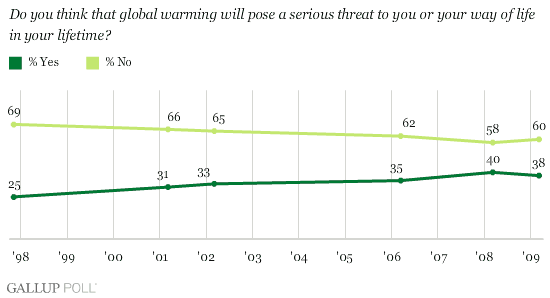
Bottom Line
Americans generally believe global warming is real. That sets the U.S. public apart from the global-warming skeptics who assembled this week in New York City to try to debunk the science behind climate change. At the same time, with only 34% of Americans saying they worry "a great deal" about the problem, most Americans do not view the issue in the same dire terms as the many prominent leaders advancing global warming as an issue.
Importantly, Gallup's annual March update on the environment shows a drop in public concern about global warming across several different measures, suggesting that the global warming message may have lost some footing with Americans over the past year. ���۴�ýhas documented declines in public concern about the environment at times when other issues, such as a major economic downturn or a national crisis like 9/11, absorbed Americans' attention. To some extent that may be true today, given the troubling state of the U.S. economy. However, the solitary drop in concern this year about global warming, among the eight specific environmental issues ���۴�ýtested, suggests that something unique may be happening with the issue.
Certainly global warming has received tremendous attention this decade, including with Al Gore's Academy Award-winning documentary "An Inconvenient Truth." It is not clear whether the troubled economy has drawn attention away from the global warming message or whether other factors are at work. It will be important to see whether the 2009 findings hold up in next year's update of the annual environmental survey.
Survey Methods
Results are based on telephone interviews with 1,012 national adults, aged 18 and older, conducted March 5-8, 2009. For results based on the total sample of national adults, one can say with 95% confidence that the maximum margin of sampling error is ±3 percentage points.
Interviews are conducted with respondents on land-line telephones (for respondents with a land-line telephone) and cellular phones (for respondents who are cell-phone only).
In addition to sampling error, question wording and practical difficulties in conducting surveys can introduce error or bias into the findings of public opinion polls.
